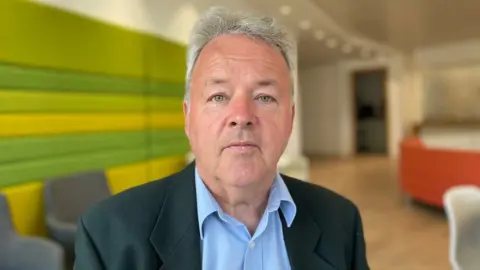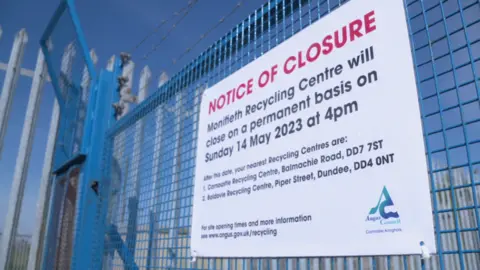Scotland's councils need radical change, says spending watchdog
 BBC
BBCThe public should be "very worried" about the scale of the financial challenges facing councils, a spending watchdog has warned.
The Accounts Commission said local authorities must radically change how they operate in order to maintain and improve the services they offer.
Auditors said budget constraints and cost pressures are putting councils' finances under "severe strain".
Adult social care and housing are among areas of concern.
These areas, along with environmental services and culture and leisure, are where a new Accounts Commission report concludes service performance was "at risk or declining".
A "new deal" between the Scottish government and the country's 32 councils, which is aimed at allowing more long-term planning and could allow new local taxes, is "long overdue", the report adds.
Council services across Scotland have been impacted by financial pressures in the last year.
In Aberdeen, campaigners have been fighting the closure of libraries and a swimming pool, while in West Lothian a number of leisure centres are earmarked for closure.
Tim McKay, acting chairman of the Accounts Commission, was asked on BBC Radio's Good Morning Scotland how worried people should be about the state of local authorities.
He told the programme: "I think we should be very worried because the funding statement is being reduced in real terms.
"As you know, the cost of living is going up dramatically so there is just going to be much less money available for councils to deliver those services."

Mr McKay said councils often made incremental savings when they drafted an annual budget but did not take a "more radical step" and introduce long-term changes.
He added: "To some extend they are not encouraged to do that because they only get one-year settlements, typically, from the Scottish government.
"So that's why this new deal is so important.
"It won't necessarily put more money on the table but at least it will allow them to get a settlement over three, five years, whatever to allow them to plan ahead better."
'Open and honest conversations'
Mr McKay would not be drawn on whether Scotland had too many councils and said that was a matter for politicians.
But he said local authorities needed to have "open and honest conversations" with their communities and staff about how they will operate in the future.
Earlier he warned failure to address the funding problem would have a negative impact on services and potentially result in "deeper cuts".

Recycling centres in Monifieth and Kirriemuir closed recently, saving Angus Council an estimated £100,000 per year.
It means locals will now have to take waste to centres in Carnoustie or Dundee, six and five miles away respectively.
Monifieth resident Emily Hendry, 64, said: "It's going to affect the community, a lot of the older generation stay here and they don't have cars.
"We pay a lot of council tax, so we're entitled to get a lot of things done."

Steven Ludlan, 72, said: "I've now got to go to Dundee, which makes me spend more money on fuel."
He said he had some sympathy for councils, but would "just like to see them spend money wisely."
He said: "Some councils can budget wisely and other councils just seem to do things ad hoc, as it were.
"A lot more can be done, but obviously different places need different things."

The Audit Scotland report highlights how 23% of council budgets were ringfenced or directed for national policy initiatives in 2021/22 - up from 18% in the previous year.
This type of funding supports the delivery of key Scottish government policies but "it prevents councils from making decisions about how funds can be used at a local level, to meet local need", the report adds.
Analysis by Audit Scotland shows spending on children's services and adult social care has been protected and increased because of Scottish government policy directives over the last decade.
However, the remaining "unprotected" services have borne a "disproportionate level of spending reductions", according to auditors.
The Scottish government has said it will review all ring-fenced funding as part of the delayed "new deal" for local government.
The Audit Scotland report calls for councils to be more transparent with the public about scale of demand, the extent of backlogs and the need to ration access to services.
'Increased cost pressures'
It also calls for a more collaborative approach between public bodies.
Shona Morrison, president of council umbrella body Cosla, said this was demonstrated during the response to the Covid-19 pandemic.
She added: "The report also recognises the huge challenges councils face due to budget constraints, increased cost pressures and demand, and increases in directed and ringfenced funding.
"As we have all seen, increasingly difficult choices are required about spending priorities and service provision, given reducing budgets coupled with growing demographic and workforce pressures."
The Scottish Conservatives said urgent action was needed to avoid cuts to local services that would have a "devastating impact on our most deprived communities and the most vulnerable people living in them".
The party called on the first minister to "come good on his promise of a New Deal for local government as soon as possible".
Scottish Labour said the report "lays bare the scale of the crisis facing local government after years of cuts and centralisation by the SNP and the Greens" and said the government should stop "robbing funding from communities".
Local government minister Joe FitzPatrick said: "We recognise that the work of both local and national government is vital in delivering sustainable public services our communities rely upon.
"That is why the Scottish government is committed to working with Cosla to agree a 'new deal' for local government that promotes empowerment and provides greater flexibility over local funding with clear accountability for delivery of shared priorities and outcomes."
